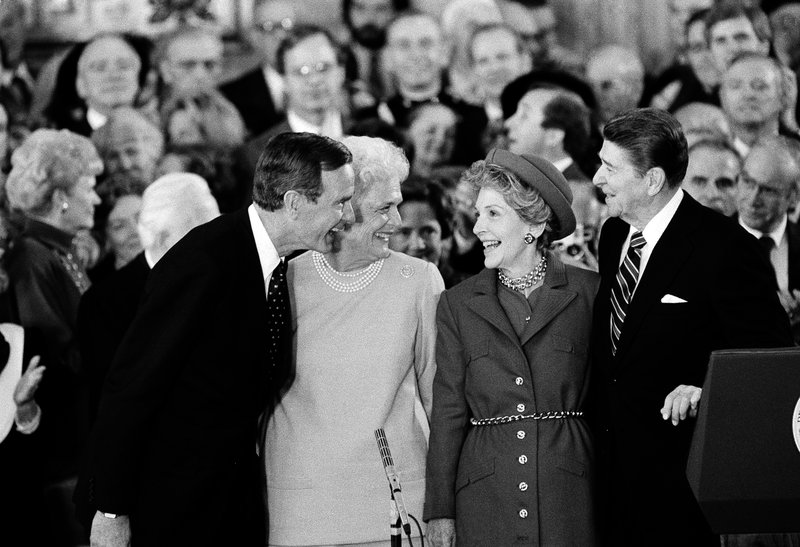WASHINGTON (AP) — Barbara Bush leaned over the seat on Air Force Two and glared at me. It was 1984, and her husband, Vice President George Bush, was running for re-election with President Ronald Reagan. On that day, she was fuming and she didn’t bother hiding it.
“It rhymes with rich,” she told me, describing her husband’s political opponent, Geraldine Ferraro, the Democratic vice presidential nominee.
The vice president later told me she considered it the most embarrassing episode of her life. She said much the same.
Barbara Bush was a formidable woman, beloved by many. But her grandmotherly white hair and fake pearls were deceiving. She was intimidating, no one to mess with.
“She tended to be the enforcer” in the family, her son former President George W. Bush once said. “Her willingness to speak her mind stood in contrast to some tightly scripted political spouses.”
As a reporter for The Associated Press covering the White House, I occasionally came in contact with her. Then, in 1984, I stepped away to cover the vice president on the campaign trail. I spent months with Bush and his wife on Air Force Two traveling around the country.
Bush went to places that Reagan’s team deemed less important. His job was to show the flag, carry the president’s message. He rarely made news on his own.
So, there we were, flying to New York for the Columbus Day Parade, another routine assignment. Only two reporters were on the plane: myself and Ira Allen of United Press International. The vice president and his wife stopped by our seats before takeoff.
Unexpectedly, Barbara Bush started fuming about recent mocking criticism by Democrats about the Bush family wealth — even the vice president’s Ivy League wristwatch bands. Clearly the needling had gotten under her skin. She went on for a few moments until I teased, “Well, you’re not exactly paupers.”
She fixed me with a hard look and shot back with a slap at Ferraro. Barbara Bush said that she and her husband never tried to hide their wealth, unlike that “4 million dollar … I can’t say it, but it rhymes with rich.”
Shocker. End of conversation. The Bushes went to their compartment, and I sank back into my seat and marveled over what had just happened, playing it over in my mind. “Rhymes with rich.” Allen, the other reporter, ended my reverie. “What are you going to do with that?”
Clearly, she must have thought conversations on the plane were off the record, I reasoned. But there was no such rule. So, we decided to report it. It was a little dicey because we had not taped the conversation, and she could deny saying it or claim she was misquoted.
But that didn’t happen. In New York, she put out a statement expressing regret. She also called Ferraro and said she had really meant “witch,” not bitch.
Ferraro spoke about the incident years later. “At the time, I was annoyed at her. I thought, ‘How does a woman act like that?’ I felt that it was a terrible put-down, a terrible class put-down,” Ferraro said, according to the late Donnie Radcliffe, a Washington Post reporter who wrote a biography of Barbara Bush. “I was hurt, but I gave her credit for calling as quickly as she did. I told her not to worry about it, that we all say things at times we don’t mean.”
Radcliffe, who died in 2010, a year before Ferraro, also captured Barbara Bush’s anguish about the episode.
“I just can’t believe I did that to your brother,” Bush had told her husband’s sister, Nancy Ellis, back then. “I’ve been crying for 24 hours and I’ll never stop. How could I have done it?”
Four years later, Bush was running for president. I was on a campaign bus with him and his wife in California. “There he is, Bar. Terry. He’s the one,” Bush playfully told his wife. She pretended she didn’t know what he was talking about. I was thankful, because I’d always felt bad about what happened.
But, of course, there was another dustup, this one about an interview I had with the first lady after Bush was elected president. I asked what she thought about assault weapons, such as the one that a gunman had used to kill five children at a California schoolyard in 1989. She said they were illegal, and I said no, I didn’t think they were. I asked, “Do you think they should be?” ″Absolutely,” Barbara Bush replied.
The problem was that her husband, the president, didn’t feel the same way, and Barbara Bush’s comment forced him into a public disagreement with her. He said he was “not about to say semi-automatic hunting rifles ought to be banned. Absolutely not.”
I was in the Bush doghouse, again.
AP

